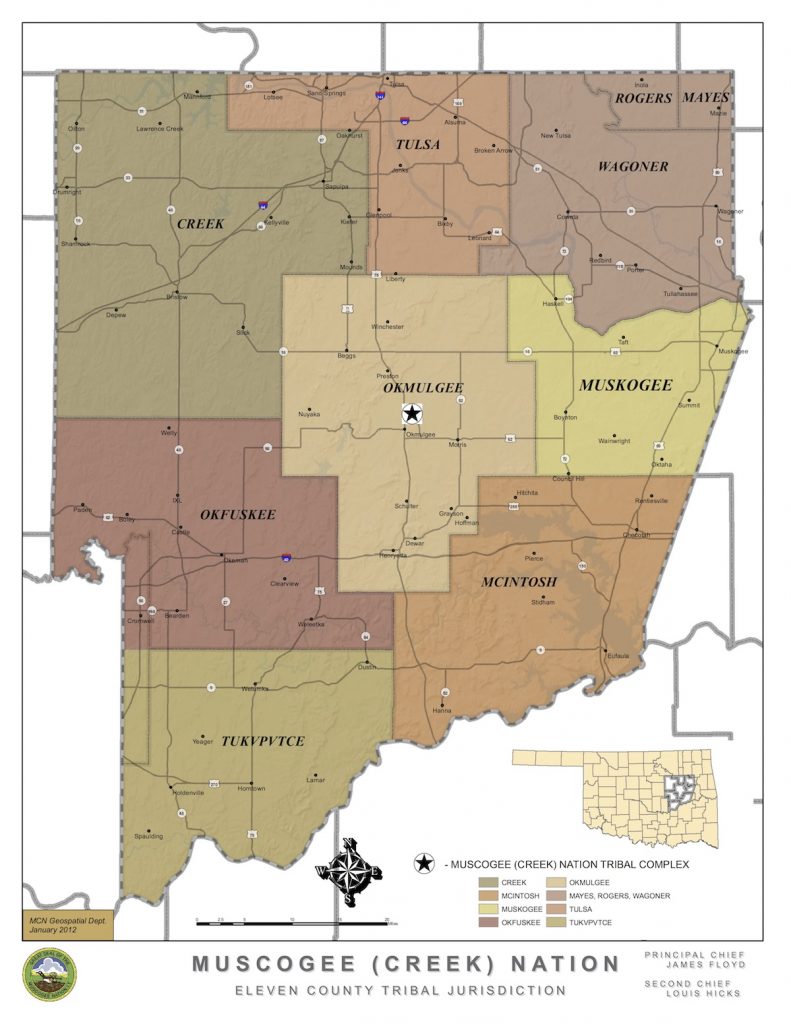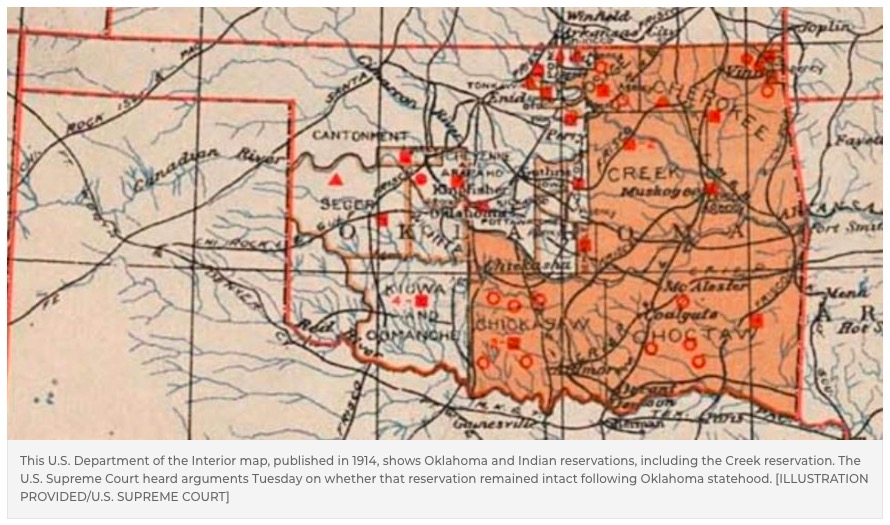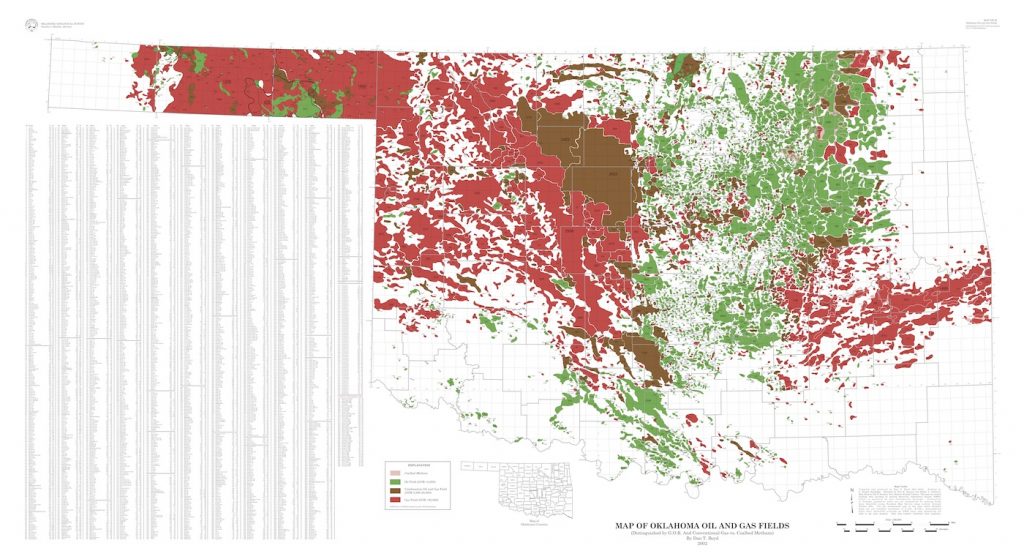
The United States Supreme Court heard arguments yesterday in Carpenter v. Murphy, in which a Native American on Oklahoma’s death row contends that he was convicted in the wrong court, the Oklahoma court, because he is an Indian alleged to have committed a crime in a portion of eastern Oklahoma that is still, technically, the Muscogee/Creek Indian Reservation and thus should have been tried in federal court.

The law and facts seem pretty clear: the federal government gave the Creek nation their Oklahoma reservation after President Andrew Jackson marched them out of their southeastern homelands in 1830. Congress officially recognized the reservation in 1866, never disestablished the reservation, and in 1906 affirmed those reservation boundaries and tribal rights:
Indeed, while Congress has revoked treaties regarding other Indian reservations, it never did that in Oklahoma. Today in the Supreme Court, lawyer Lisa Blatt representing Oklahoma told the justices that when the state became a state, that automatically stripped Indian lands of their reservation status. Justice Kagan, however, noted that the Supreme Court has repeatedly required that Congress explicitly terminate Indian land rights. And while Congress has done that in other places and for other reservations, it did not do that in Oklahoma. Justice Breyer noted that in 1906, Congress explicitly continued all tribal rights for the five tribes in Oklahoma [Nina Totenberg, “Supreme Court: Should Eastern Oklahoma Be Considered an Indian Reservation?” NPR: All Things Considered, 2018.11.27].
Some justices seemed more concerned about practical impacts rather than the letter of the law:
There are 1.8 million people living in this area. They have built their lives not necessarily on criminal law but on municipal regulations, property law, dog-related law, thousands of details. And now, if we say really this land … belongs to the tribe, what happens to all those people? What happens to all those laws? [Justice Stephen Breyer, in Justin Wingerter, “U.S. Supreme Court Justices Skeptical of State’s Claims in Creek Reservation Case But Concerned About Outcomes,” NewsOK, 2018.11.27]
No one in power was particularly concerned about declaring the southeastern United States an exclusive white reservation and forcing the locals to walk 1,000 miles to the new homes we forced upon them; it seems odd that the Supreme Court would presume to rewrite and erode tribal rights now for the sake of “practical concerns” that would not force one white person to abandon her property in Oklahoma.
Both Oklahoma’s Attorney General and the Muscogee Creek Chief agree that the consequences of a ruling that the reservation still exists would not lead to the “earth-shattering” consequences alleged by the lawyer representing Oklahoma:
MICHAEL HUNTER: We work together well collaboratively, thoughtfully, respectfully. So it won’t be the end of the world, but it will certainly be, again, a misstep from the relationships that we have with tribes right now.
TOTENBERG: Chief Floyd agrees, noting that tribal members are citizens of the state, too.
FLOYD: If we were to win, you would not see some earth-shattering changes overnight [Totenberg, 2018.11.27].

But Oklahoma’s oil industry certainly thinks acknowledging the historical fact of Native claims to that much Oklahoma would disrupt their business:
Groups representing oil and gas companies and the state’s business community also urged the Supreme Court to intervene, framing the situation as economically disruptive. “By effectively declaring half the state to be Indian country, the Tenth Circuit’s decision will upend practically every aspect of Oklahoma’s legal and regulatory regime,” the Oklahoma Independent Petroleum Association complained in its brief [Matt Ford, “The Grisly Murder Case That Could Turn Half of Oklahoma Back Into Tribal Lands,” The New Republic, 2018.03.15].
SCOTUSBlog observer Ronald Mann thinks those practical concerns will still prevail:
At the end of the day, though, I have the strong impression that the court, one way or the other, is not going to disrupt the long-settled allocation of authority. Blatt’s comments in her brief rebuttal were telling: The convictions of “155 murderers, 113 rapists, and over 200 felons who committed crimes against children,” she maintained, would be overturned by a ruling for Murphy. The justices might struggle to coalesce around a rationale, and it might take them several months to produce a decision, but the argument did not leave much doubt about the ultimate outcome [Ronald Mann, “Argument Analysis: Justices Dubious About Ramifications of Broad Indian Reservation in Oklahoma,” SCOTUSBlog, 2018.11.27].
We’ll come back to this issue in a few months when the Supreme Court figures out whether those practical concerns outweigh what the law clearly tells us, that the Muscogee Creek Reservation exists.
I believe current events should decide this case. When a Muslim kills and mutilates another Muslin and oil is involved, then no crime has been committed. No harm, no foul. As long as no white Christians were harmed, what’s the problem? Next case.
RBG and Breyer were said to be sorta siding with the cons while Sotomayor and Kagan were for sovreignty of the tribes. Kavernmouth recused himself so this could end up 4-4 and appeals court decision stands, but not as precedence.
Ironically – the judicially “conservative” interpretation of the law – would seem to me to dictate that the reservations stand. I guess we’ll find out what the modern day interpretation of “conservatism” re: the law really is when this case is decided – which judges are actually conservatives and which are simply economic ($$$) facilitators (vs more broadly focused societal facilitators).
Hey El Rayo, the issue you bring up is in a TOTALLY DIFFERENT COUNTRY. So remember that first before you cry liberal rants. FFS. And also watch (read) the Looming Towers show. This isn’t something new…
And it’s 2018. When is any of you liberal hearts going to start to focus on Reservations? How is their existence needed today? How does a Reservation system help them? Because it doesn’t.
Hey Steve Peason, the clinic called and wants to see you for a brain scan. How it’s existence is needed today and how it would help you is anyone’s guess. Turns out the last one showed a complete void.
The reservation system is the law of the land, however much state and federal governments sometimes tries to bend those laws. Treaties were negotiated, and from the US government side those treaties are based in Constitutional law. When the idea of termination of reservations came up in the 1950s (which is what Steve Pearson advocates) that was tried on several reservations. It was a failure. It ended up assets being transfered from tribes to corporations, and poverty and joblessness increased. There are books written about the failures on the Menomonee Reservation and others.
I hope the Justices follow the letter of the law and the Constitution, not bend their decision to satisfy the prejudices and hate of people like Mr. Pearson.
Interesting case. I am surprised it is even in the SCOTUS. Under current law it seems quite settled that if a crime occured on Indian land, as Cory’s comment seems to suggest here, then the State has no criminal jurisdiction, regardless of policy implications. Either the tribe or the feds, or both, have exclusive jurisdiction. Normally no court can modify that rule, rather, it takes an act of Congress. It will be fascinating to read the outcome of this particular case.
As a side matter, Pearson’s comment should qualify for an award of one of the most unintelligble comments ever posted on DFP. Is he thinking of a run for POTUS? His comment challenges even Trump’s typical word salad. I commend anyone who can make heads or tales out of either one.
So is Old Sferbrains breaking wind some moar or is he passing himself off as a Lakota culture expurt, again?
Were did you say yer wife was a 70k/year teacher in Northern Mississippi?
Having worked in Oklahoma in the late 60’s and early 70’s I was always intrigued by the borderless reservations. You literally did not know for the most part where you entered and where you left. I don’t know if this part of the jurisdiction problem SCOTUS will be taking up.
If the state of Oklahoma wants to have a jurisdiction fight with the tribes it will be costly in a number of ways.
I was born on the Yankton Reservation (Wagner) and raised on the Pine Ridge Reservation where I was an enrolled member of the Oglala Sioux Tribe.
My family never lived under any government rule, tribal or federal. We were always aware that we lived under two jurisdictions, but as long as we behaved the laws didn’t matter much. Most governments deal mostly with criminal laws.
I spent over 50 years of my life living on the Pine Ridge Reservation where I lived trouble free.
Fellow tribal are some of the greatest people you would ever want to know and you can easily understand why they protect the reservation, it is theirs, they own it.
Old Sarge, your militaristic point of view toward all things should have gone “Night Night” after Wounded Knee!
The Russian and his militaristic views are jut that, a view with his head stuck up his arse. Nothing but ill wind.
Jake and Jerry you have no reservation experience nor would either of you last a weekend much less a week someplace like Pine Ridge.
Attacking me doesn’t change the facts. The people of Pine Ridge do not run their own land. Our own government have destroyed the schools, infrastructure and community. It is over run with drugs and suicide. Sure they have a “supposed” local government but they do not understand the government that rules over them. The Tribe must beg for financial assistance. very sad to treat an honorable people like our government does. Forced socialism.
Getting back on topic it appears my original post missed the issue. The facts are not clear at all and the issue seems to be how to resolve the factual issue of whether the land in question still constitutes a reservation.
The law is relatively clear, but to resolve the factual dilemma it appears the SCOTUS will revisit established judicial precedent. The Court will decide whether to retroactively modify what it has previously accepted as the means of terminating a reservation. It looks as if policy considerations and practical implications of following precedent will undermine the lower court’s decision, which apparently followed the SCOTUS existing jurisprudence in its decision that the reservation was never terminated under the existing stands for termination.
On another matter, who is this “barebutt” OldSarg is fixated on (OS comment at 2018-11-28 at 12:25)? I have never seen a post under that name. It does have some salacious Freudian implications, however, creating an image that apparently titilates OldSarg to some end.
“apparently titilates OldSarg to some end” somewhat.
bcb, On top of everything, the Russian is also a perv.
I would challenge Old Sarge to go the Oglala Lakota College and spout his Lakota expertise or garbage.
Old Sarge contends that Jerry and Jake wouldn’t last a weekend on the Pine Ridge Reservation, it is my contention that Old Sarge and his expertise wouldn’t last an hour.
There is so much I could write about this case and Indian law, but I have neither the time nor the inclination to educate Old Sarge and other ignorant South Dakotans like him.
Ol sarge has been on the rez. But I can guarantee everyone he doesn’t speak there like he does here. Heck he’s made money off the ‘screwed up system’. Then brought that money off the rez to pay his mortgage with.
But this isn’t about ol sarge it’s about the difficult situation the greatest country in the world has dealing with the ancestors of the indigenous people that were forced at gunpoint onto reservations so their historical land holdings could be taken as spoils of manifest destiny and greed.
As many would ssy. The mistake you made was you didn’t kill us all. We are still here. Sharice David, Ho-Chunk tribal member and newly elected congress woman from Kansas, worked at Red Cloud school and Thunder Valley CDC.
Hey sarge… you gave me some advice and I took it. You told me to ‘find some peace’.
Mr. OldSarg does again write much which seems wise, wiser than any of the name-calling-out-of-staters ever write about the South Dakota reservations, but the Mr. Spike, a young fellow with much personal experience on South Dakota reservations refutes it, and we are left go say as the young people say “huh?”
Roger Cornelius: I never mentioned the valiant efforts of Oglala Lakota College but I did mention IHS, as did Cory in his article this morning “The Indian Health Service has such limited funds the federal agency can’t afford to specifically assign a person as a point of contact for South Dakota’s Healthcare Solutions Coalition, state Health Secretary Kim Malsam-Rysdon said Wednesday.” If every thing is so hunky dory on the Res why can they not even have someone as a POC to represent them to the state?
Spike: “Heck he’s made money off the ‘screwed up system’” I only made the wages the government provided me to bring low income housing and infrastructure to the reservation. Yes, I was part of the same government that doles out funds to the Reservations so long as they abided by the government wishes. It was pathetic. There is no real freedom on the reservations. Sure, you can walk around free but if you want expected services such as housing, food, medical care, electrical or sewer you have to plead to both the federal government and their bureaucratic rules as well as the tribal government and their biased family priorities.
OldStopgap knows more than actual residents of reservations. I suppose he is another stable genius in his own mind.
At least i have a job and HRC had emails. Magat!
mike~ you are commenting on something you don’t know anything about again.
Richard: “Ironically – the judicially “conservative” interpretation of the law – would seem to me to dictate that the reservations stand.”
That IS ironic, isn’t it? Professed “Originalist” or “Textualist” Judges, like Gorsuch and Kavanaugh, should be on the side of the reservations, because a strict interpretation of the letter of the law would dictate that. And yet they are not. I guess they are only “Originalist” when it meets their agenda.
you get no argument from me on those facts ol sarge. very hard to bring development to the rez.
But my point was that so much of the money sent to the reservations has enriched many of the people most critical of the situations. Border towns often came to being, existed and thrived (or continue to thrive) because of the reservations and their economies. Thousands of head of non member owned cattle graze the reservations today and far into the past.
The supremes got a real tough case on their hands. Those pesky treaties the US made with the occupants of the lands that were coveted by others can still haunt the great white father and his flock. Why do I get the feeling this can will get kicked down the road?
Lance Morgan, Ho-Chunk Inc CEO (Winnebago tribal member, Harvard grad and son in law of Warren Buffet) says if he has to mention one thing as the largest cause of poverty and lack of development on the reservations, in his opinion it is the trust status of land.
It would be kinda fun to see the reservation boundaries upheld. As Chief Floyd said, nothing much would really change, except the US constitution would be applied fairly to the American Indian citizens. That would be a surprise.
The oil and gas companies would have a harder time cheating them. When the sovereignty of Indian nations is honored, and they’re given a decent opportunity, they generally do pretty well. Examples include the Shakopees in Minnesota, the Mohawks in New York, Mohegans in Connecticut and others.
When Indians are stuck out on some worthless chunk of land with little or no infrastructure, and are continually beset by mostly white people writing laws designed to cheat them even further, they don’t do as well.
But it’s not only American Indians in that situation. There are people all around the globe of all kinds of ethnicities in similar circumstances. Some are even white skinned!
TAG’s legal point is really important. In this case, maintaining the status quo will require the “conservative” judges to be “activists,” to ignore what the law says and what Congress has done and reinterpret the law to allow business to continue as usual. They have to say the law does not matter as much as practicalities.
Is that really a conservative position?